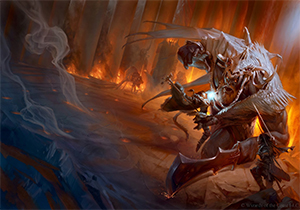3 Things Grognards Can Love About 5E

 Bringing old school gamers to the new classroom
Bringing old school gamers to the new classroom
I’ll admit to struggling in my transition to Dungeons & Dragons 5E. For the old school gamers out there, there are some things to really like.
What follows are my 3 favorite things about 5E as an old-school curmudgeon.
1) Ability Scores
2-3_______ -4
4-5_______ -3
6-7_______ -2
8-9_______ -1
10-11_____ 0
12-13_____ +1
14-15_____ +2
16-17_____ +3
18-19_____ +4
20-21_____ +5
One of the first things that hits you about this and most any gaming system is the ability scores. In coming from 1E /2E to 5E one of the first things I enjoyed was the simplified ability scores. All stats, across the board all have the same bonuses and penalties. It can be argued that 1&2E did this too, but 5E really tidied things up here a bit.
That’s it, for all the ability scores. In 1E / 2E we had to muddle through all the stats with numerous adjustments for weight, bending bars, saves, and all sorts of various circumstances that might apply to the ability score.
At first glance, this might seem a little nutty, but it does make sense. The DM tosses a DC (Difficulty Class) onto various tasks at hand, to which the bonus or penalty will apply.
Not only does this clean up the character sheet, but it does simply a number of game mechanics nicely.
2) Difficulty Challenges
Difficulty Challenges (DC) are really a tidy fix to numerous things. Picking locks, jumping a fence, swimming the river, the DM only has to toss on a DC to the task at hand.
DC’s generally range from 10 – 30. This is over-simplifying the concept significantly, but as a DM and a player it feels almost as easy as it sounds.
3) Spell Slots
This is possibly one of my favorite strokes of genius in the 5E rules. We were grasping at a solution like this for years, were coming close, but 5E offered the answer.
In Dungeons and Dragons 5E, a wizard or cleric doesn’t memorize and hold spell in memory to cast them. They gain slots of power that they can tuck spells they know into. Instead of the spell being lost, the slot of power is expended – until the wizard can rest again.
For clerics, this is wonderful. It keeps the cleric from situations like a pile of Cure Light Wound spells, and being stuck with ONLY those spells.
It also makes a better logic in game terms. Memorizing 3 instances of magic missile seems a little silly if you think about it. But knowing the spell, and applying its’ use three times does make sense.
Wizards and clerics know and can pray for spells, they have a limited number of spells per level they can cast, they get to apply any spell to those slots as they see fit. Welcome to being useful casters and not HOPING you are equipping appropriate spells.
Well done 5E. well done.
Old School to new
A number of the ideas presented in 5E can be brought to your 1E or 2E game if desired, without switching systems. Spell slots being quite easy to apply, DC’s being only a slight challenge, and standardizing ability scores more difficult. At some point, you may need to just try 5E in full force. It is a very different game from the old days though. It isn’t “Like 1E”.
This article isn’t to suggest it’s better or worse, just different. The books or at least the FREE SRD are worth the read. These aren’t the only good points of the system for old Grognards to swipe and add to their table.
Have you adapted any 5E rules to your old school game?



